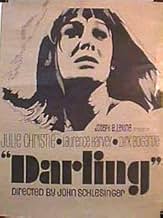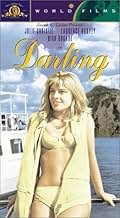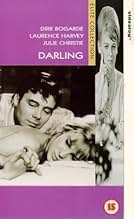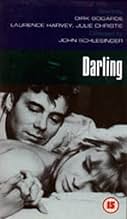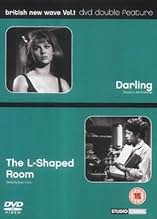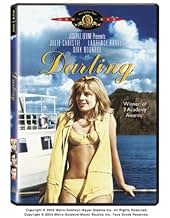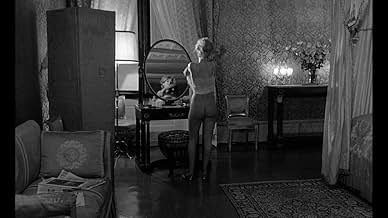IMDb RATING
7.0/10
8.4K
YOUR RATING
Beautiful but amoral model Diana Scott sleeps her way to the top of the London fashion scene at the height of the Swinging Sixties.Beautiful but amoral model Diana Scott sleeps her way to the top of the London fashion scene at the height of the Swinging Sixties.Beautiful but amoral model Diana Scott sleeps her way to the top of the London fashion scene at the height of the Swinging Sixties.
- Won 3 Oscars
- 17 wins & 8 nominations total
José Luis de Vilallonga
- Prince Cesare della Romita
- (as Jose Luis De Vilallonga)
T.R. Bowen
- Tony Bridges
- (as Trevor Bowen)
Featured reviews
This is a breakthrough film depicting what a female with a fairy tale-like upbringing experiences when she gets into the real world. Julie Christie is magnificent as the free-spirited, swinging role model for women everywhere. She has men falling right and left for her and even promises of wealth beyond imagination. But her unfulfilment is perfectly depicted in this daring and innovative film. She falls for a famous dashing tele-journalist, but realises soon enough that she is no match for his brain. She falls for a slick and smarmy executive, hoping to find her place with the jet set. She sees the shallowness of that existence soon enough! She does eventually find some taste of fame and is swept away to Capri, one of the most romantic and beautiful spots in the world. But there she sees only the shallow reflection of her outer beauty when confronted with the deeper beauty of elderly women praying with grace and humility at a local church. She does also manage to meet a prince who wants to marry her. He gives her wealth, a title, an enormous glamourous estate, a tailor-made family (from a previous marriage) and his deepest admiration. Unfortunately, his admiration is no more deep for her than it might be for his prize horse or Rolls Royce. She has everything but love.
The film has much to say about the illusions of glamour that women are compelled to fulfil. They are compelled to fulfil those illusions because they never had an inkling that there could be anything else. Women could rub shoulders (and other body parts) with men of brilliance, of power, and of wealth, but their own surface existence could never be a match. The film is essentially a tragi-comedy, for beneath the delightful exterior of the film is the harsh reality that a surface life is no match for a life with purpose.
This film is also amazing because it is one of the few films that actually shows characters living in a real world, not just a world that revolves around the characters. Schlesinger fills the screen with a myriad of realities. The man on the street pontificating his views on city life, a famous author, celebrities, bohemians, a gay photographer who is not traumatised about what he is, and even that great symbol of solid innocence - the elderly woman feeding the pigeons at Picadilly Circus, they are all essentially equal in importance. We in fact are mainly introduced to Christie's character as she is plucked out of the street in an indiscriminate interview. She is much a product of the world as anyone else.
The film is still timely today, since there are still so many women who cling to the images and myths of ideal womanhood (ie: an illusion without soul or intelligence). All the performances are smashing. And yes, it is true, that swinging sixties feel is irresistible!
The film has much to say about the illusions of glamour that women are compelled to fulfil. They are compelled to fulfil those illusions because they never had an inkling that there could be anything else. Women could rub shoulders (and other body parts) with men of brilliance, of power, and of wealth, but their own surface existence could never be a match. The film is essentially a tragi-comedy, for beneath the delightful exterior of the film is the harsh reality that a surface life is no match for a life with purpose.
This film is also amazing because it is one of the few films that actually shows characters living in a real world, not just a world that revolves around the characters. Schlesinger fills the screen with a myriad of realities. The man on the street pontificating his views on city life, a famous author, celebrities, bohemians, a gay photographer who is not traumatised about what he is, and even that great symbol of solid innocence - the elderly woman feeding the pigeons at Picadilly Circus, they are all essentially equal in importance. We in fact are mainly introduced to Christie's character as she is plucked out of the street in an indiscriminate interview. She is much a product of the world as anyone else.
The film is still timely today, since there are still so many women who cling to the images and myths of ideal womanhood (ie: an illusion without soul or intelligence). All the performances are smashing. And yes, it is true, that swinging sixties feel is irresistible!
I find this movie unique. If you have read of, or can remember the mid-1960s, you know that the character Julie Christie plays was absolutely the one adored by everyone- by all who considered themselves "in" and "trendy" and "modern". And she is completely taken apart by this movie.
I can think of only one other movie at any time in any language that so thoroughly demolishes the pretensions of the very people whom the smart set aspired to be at the time the movie was coming out. Amazingly that movie was 'Alfie', that came out about that same year. (A movie like La Dolce Vita is in a different mode - the people are the new meretricious post-war haute bourgeois class - a frequent target through history, and in that way, like The Ice Storm or Interiors or American Beauty as an attack on such values).
Virtually all "serious satires" take on targets that the "chattering classes" consider suspect - the hidebound, the hypocritical, the "authority figures" whom youth wish to overturn. Not this one. Astonishingly, in the midst of mod London, the very middle of the swinging 60s, you get a movie that looks at its non-committal "live for the moment" hedonistic experimentation and blasts its moral character with a cannon.
This just doesn't happen in movies - compare say, "If" or "O Lucky Man" or say, "Network" (to name three I like), and you'll see the targets as the familiar powers that be - from school to television. But Julie Christie's character is what people thought was new and wonderful - and its superficiality is blown to bits.
It's as if a movie now were to look at a poor black woman raising a child alone - and blast her for any behavior that contributed to this state. It just won't be done - the sympathies are all running FOR that character. So were the sympathies for the Julie Christie character in that time - and the movie is very very brave in running so utterly against the current.
I just love the movie - it's a step up from Schlesinger's earlier ones -the script is superb, the performances are excellent without exception. (Lawrence Harvey is particularly good - but of course it's Christie's movie).
Do see it. It's also full of wonderfully imaginative touches - such as the ending scene.
I can think of only one other movie at any time in any language that so thoroughly demolishes the pretensions of the very people whom the smart set aspired to be at the time the movie was coming out. Amazingly that movie was 'Alfie', that came out about that same year. (A movie like La Dolce Vita is in a different mode - the people are the new meretricious post-war haute bourgeois class - a frequent target through history, and in that way, like The Ice Storm or Interiors or American Beauty as an attack on such values).
Virtually all "serious satires" take on targets that the "chattering classes" consider suspect - the hidebound, the hypocritical, the "authority figures" whom youth wish to overturn. Not this one. Astonishingly, in the midst of mod London, the very middle of the swinging 60s, you get a movie that looks at its non-committal "live for the moment" hedonistic experimentation and blasts its moral character with a cannon.
This just doesn't happen in movies - compare say, "If" or "O Lucky Man" or say, "Network" (to name three I like), and you'll see the targets as the familiar powers that be - from school to television. But Julie Christie's character is what people thought was new and wonderful - and its superficiality is blown to bits.
It's as if a movie now were to look at a poor black woman raising a child alone - and blast her for any behavior that contributed to this state. It just won't be done - the sympathies are all running FOR that character. So were the sympathies for the Julie Christie character in that time - and the movie is very very brave in running so utterly against the current.
I just love the movie - it's a step up from Schlesinger's earlier ones -the script is superb, the performances are excellent without exception. (Lawrence Harvey is particularly good - but of course it's Christie's movie).
Do see it. It's also full of wonderfully imaginative touches - such as the ending scene.
"Darling", as it happens with most genuine works of art, it grows, it develops over the years and acquires a sort of clarity that, with the benefit of hindsight I will dare to call it, prophetic, as a social observation of its time. But what matters most is the film as a film. Brilliantly thought, written, directed, photographed and, of course, acted. Julie Christie became a symbol. She, clearly a very intelligent woman, surfed the waves of fame with an apparent detachment that I'm sure it's a sure sign of maturity and of a great respect for her profession and herself. If you think I love Julie Christie, you're right. But my love for her has to do with "Darling" and the age I was when I first saw it. The 60's were already in the past then but I saw them in the future, an immediate future.I can't imagine anyone, from any age, who loves film could be indifferent to this tale of isolation in a world moving fast towards an acceptable cult for celebrity. Not to be missed.
Julie Christie is "Darling" in this 1965 film directed by John Schlesinger, and also starring Dirk Bogarde and Laurence Harvey. Schlesinger does a beautiful job of showing us '60s London as it was, and yet he managed to make a film that is just as timely now.
Julie Christie is model Diana Scott, a gorgeous, ambitious young woman who moves from man to man without attachment and with the intention of helping her career.
She dumps her first husband and breaks up the marriage of a British journalist (Bogarde) and then moves on to a pleasure-seeking advertising executive (Harvey), and finally, marries an Italian prince.
It's one of those lives that sounds great - she has beauty, money, men, glamour, travels in the circles of the beautiful people. But she has no emotional attachments, no love, and nothing that she has feels right or is anything she wants. All the external trappings of celebrity, but it's a shell.
A really terrific movie, and I have to agree with the posters whose comments I read that Julie Christie is perfection in every way. Bogarde and Harvey give her excellent support. As an aside, Christie's wardrobe is stunning.
None of the characters are very likable, except perhaps Bogarde, who in spite of leaving his wife and family does truly love Diana.
Despite the cold realities of Darling, we're even more obsessed with celebrity today, which makes the film even more interesting. But when you look at a photo, see someone in a magazine or on the screen, you're only dealing with a persona, not the flesh and blood individual. It's a fantasy.
Darling shows the audience what's behind the fantasy - and it's not very pretty.
Julie Christie is model Diana Scott, a gorgeous, ambitious young woman who moves from man to man without attachment and with the intention of helping her career.
She dumps her first husband and breaks up the marriage of a British journalist (Bogarde) and then moves on to a pleasure-seeking advertising executive (Harvey), and finally, marries an Italian prince.
It's one of those lives that sounds great - she has beauty, money, men, glamour, travels in the circles of the beautiful people. But she has no emotional attachments, no love, and nothing that she has feels right or is anything she wants. All the external trappings of celebrity, but it's a shell.
A really terrific movie, and I have to agree with the posters whose comments I read that Julie Christie is perfection in every way. Bogarde and Harvey give her excellent support. As an aside, Christie's wardrobe is stunning.
None of the characters are very likable, except perhaps Bogarde, who in spite of leaving his wife and family does truly love Diana.
Despite the cold realities of Darling, we're even more obsessed with celebrity today, which makes the film even more interesting. But when you look at a photo, see someone in a magazine or on the screen, you're only dealing with a persona, not the flesh and blood individual. It's a fantasy.
Darling shows the audience what's behind the fantasy - and it's not very pretty.
Julie Christie deserved her Oscar. So did the scriptwriters--"Should Popes be ancestors?" And no on-screen sex when the film is considerably about sex!
When the lead character becomes a princess one is reminded of Princess Diana's own life. Both are Dianas. A very unusual, complex work from Schlesinger.
I did not appreciate the film when I saw it in the Sixties; now I do. What a great year for Christie--this and "Dr Zhivago."
The social commentary is hard hitting--young black boys serving snacks and drinks to perverted white adults, the facetious interest of the idle rich in feeding the hungry around the world as the rich gobble food they do not need to eat, of rich princes busy renovating their palace's washing closets.
When the lead character becomes a princess one is reminded of Princess Diana's own life. Both are Dianas. A very unusual, complex work from Schlesinger.
I did not appreciate the film when I saw it in the Sixties; now I do. What a great year for Christie--this and "Dr Zhivago."
The social commentary is hard hitting--young black boys serving snacks and drinks to perverted white adults, the facetious interest of the idle rich in feeding the hungry around the world as the rich gobble food they do not need to eat, of rich princes busy renovating their palace's washing closets.
Did you know
- TriviaThe "vox pop" TV interviews conducted by Dirk Bogarde's character with people in the street were all done with genuine members of the public, not actors, and were not scripted.
- GoofsWhen Diana and Robert quarrel and he leaves the apartment they share together, a microphone is visible on the left of the scene.
- Quotes
Diana Scott: Taxi!
Robert Gold: We're not taking a taxi.
Diana Scott: Why not?
Robert Gold: I don't take whores in taxis.
Diana Scott: What do mean?
Robert Gold: That's what you are isn't it? A little whore! Isn't it?
- Alternate versionsThe original UK cinema version was cut by the the BBFC to remove shots of a man wearing a woman's corset and to heavily shorten a scene at a party in Paris where guests watch a couple making love on a hotel bed (the scene was edited to end the scene before the male partner appears). Video versions featured the same print though the cuts were later found and restored for the 2007 Optimum DVD release.
- ConnectionsFeatured in Film Review: Julie Christie & John Schlesinger (1967)
- How long is Darling?Powered by Alexa
Details
Box office
- Budget
- £400,000 (estimated)
- Gross worldwide
- $25,444
- Runtime
- 2h 8m(128 min)
- Color
Contribute to this page
Suggest an edit or add missing content



